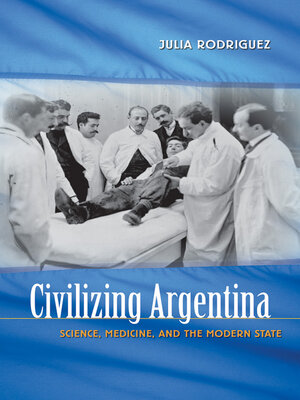
Sign up to save your library
With an OverDrive account, you can save your favorite libraries for at-a-glance information about availability. Find out more about OverDrive accounts.
Find this title in Libby, the library reading app by OverDrive.



Search for a digital library with this title
Title found at these libraries:
| Library Name | Distance |
|---|---|
| Loading... |
After a promising start as a prosperous and liberal democratic nation at the end of the nineteenth century, Argentina descended into instability and crisis. This stark reversal, in a country rich in natural resources and seemingly bursting with progress and energy, has puzzled many historians. In Civilizing Argentina, Julia Rodriguez takes a sharply contrary view, demonstrating that Argentina’s turn of fortune is not a mystery but rather the ironic consequence of schemes to “civilize” the nation in the name of progressivism, health, science, and public order.
With new medical and scientific information arriving from Europe at the turn of the century, a powerful alliance developed among medical, scientific, and state authorities in Argentina. These elite forces promulgated a political culture based on a medical model that defined social problems such as poverty, vagrancy, crime, and street violence as illnesses to be treated through programs of social hygiene. They instituted programs to fingerprint immigrants, measure the bodies of prisoners, place wives who disobeyed their husbands in “houses of deposit,” and exclude or expel people deemed socially undesirable, including groups such as labor organizers and prostitutes. Such policies, Rodriguez argues, led to the destruction of the nation’s liberal ideals and opened the way to the antidemocratic, authoritarian governments that came later in the twentieth century.
With new medical and scientific information arriving from Europe at the turn of the century, a powerful alliance developed among medical, scientific, and state authorities in Argentina. These elite forces promulgated a political culture based on a medical model that defined social problems such as poverty, vagrancy, crime, and street violence as illnesses to be treated through programs of social hygiene. They instituted programs to fingerprint immigrants, measure the bodies of prisoners, place wives who disobeyed their husbands in “houses of deposit,” and exclude or expel people deemed socially undesirable, including groups such as labor organizers and prostitutes. Such policies, Rodriguez argues, led to the destruction of the nation’s liberal ideals and opened the way to the antidemocratic, authoritarian governments that came later in the twentieth century.







